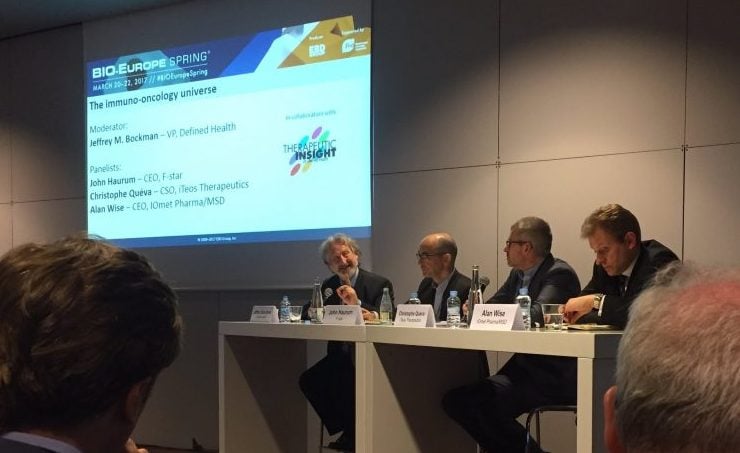Newsletter Signup - Under Article / In Page
"*" indicates required fields
The unprecedented competition in the field represents a daunting challenge for companies trying to break in. A BIO-Europe Panel discussed remaining niches.
BIO Europe’s panel on immuno-oncology was perhaps the most popular of the day, as attendees filled the room to hear the thoughts of John Haurum, CEO of F-star; Christophe Quéva, CSO of iTeos; and Alan Wise, CEO of IOmet Pharma. All of the excitement about leveraging the immune system in the fight against cancer has led to a number of company foundations and massive investments — but all of the activity has led some to advise young entrepreneurs to avoid the field.
“There has never been this much competition in immuno-oncology,” said Wise. So where is there left to go for a young biotech? The panelists were quick to agree that the field desperately needs predictive animal models for adverse effects, as “animal models are indicative but not predictive,” noted Haurum. Indeed, the rate of successful translation from animals to humans in cancer trails is reported to be just 8%.
This disconnect between animal models and clinical trials is especially problematic as “therapies get more effective but there has also been an increase in adverse effects,” said Wise. Quéva agreed that it is necessary to improve tolerability as a way to improve therapeutic index — “it’s not just about efficacy,” he said. Accordingly, it could be a good a promising space for prospective entrepreneurs.
“I’m really looking forward to someone cracking the rodent immune models,” Haurum said. “It would be a major leap forward if a CRO or academic could validate human reconstitution models of the human immune response.”
Quéva opened up the discussion of biomarkers by noting that another major challenge in immuno-oncology is selecting the right one. “The potential for finding biomarkers to predict patient responses is going to transform this space,” he said, and Haurum agreed, “It’s a hugely important part of research.”
Their importance is undeniable, given their centrality to the success of checkpoint inhibitors like Merck’s Keytruda. However, these drugs currently focus on just one marker, PD1. “That we do PD1 only now reflects that this is the only straightforward biomarker,” says Haurum. “There’s a lot of opportunity for new companies in the biomarker space.”
Haurum also had some advice on what to avoid in immuno-oncology, namely cancer vaccines: “There are a lot of companies trying to camouflage as immuno-oncology but it’s really just the recycling of old wine — repackaging tumor vaccines. I think we’ll see a lot of waste in this area.”
[poll id=1]
Oncology R&D trends and breakthrough innovations







